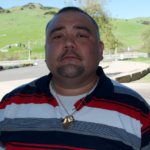
Eric Gentry
The first priority of many people leaving prison is to get a job. But going to college may provide a better way to reenter society. Just ask Eric Gentry.
Gentry runs two unique community college programs geared to those in reentry. He’s convinced that education is the key to helping turn lives around. It certainly was for him.
Growing up in Vallejo, Calif., in a gang-involved family, Gentry had cousins, uncles and parents with felony convictions. Many were in prison. Gentry dropped out of high school. And, at 18, he and his brother were involved in a murder case, resulting in a six-year sentence for manslaughter. After being released in 2010 and home for only two months, Gentry was convicted of assault with a deadly weapon and got two years.
A love of reading led to college
Never much of a student, Gentry read his first book in the county jail – and discovered that he loved reading. He devoured everything from Harry Potter to Noam Chomsky. A girlfriend he reconnected with while home for two months had enrolled at Cal State East Bay and often talked to him about college.
“I learned that I liked to read as an escape mechanism,” Gentry says. “She was saying ‘you like to read books? That’s a lot of what college is.’”
In spite of her encouragement, he took a job at a warehouse in downtown San Francisco after release. “I was there for three months and was in some of the same behaviors I had on the inside. I had an altercation with the manager and got fired,” he says.
It was following that brief job experience that Gentry decided to enroll in community college. He then went on to Cal State East Bay, graduating summa cum laude. After graduation he got a job as a case worker with an Oakland nonprofit, but at the beginning of this year was recruited to do work that will help those in reentry find their way back into society through education.
Community college programs for those in reentry
Solano Community College in Vallejo, Calif., where Gentry went to school, asked him to cofound a new initiative known as S.O.A.R., Students Overcoming Adversity and Recidivism. And this summer, he found out about another program, R.I.S.E., Restorative Integrative Self-Education, at Chabot College in Hayward, Calif, and is now working with that one as well.
Although they have slight differences, both programs are quite similar. In essence, they promote higher education to formerly incarcerated individuals.
Here’s how they work. “Someone shows up straight home from Santa Rita (Alameda County Jail in Dublin, Calif.), and I’m telling them that I’m the first step,” says Gentry. “I’ll sit them down on the computer and open applications for college and the promise grant (the California College Promise Grant that allows enrollment fees to be waived). I’ll also help them fill out the FAFSA (Free Application for Federal Student Aid) form.
In addition to helping them get into college and procure financial aid, Gentry assists students in finding jobs. That way they will be able to cover some or all of their living expenses as well. He also helps those at Chabot get bus passes. The programs provide snacks in the S.O.A.R. and R.I.S.E. offices, so they become places to hang out, where students can meet others participating in the programs.
S.O.A.R. currently has 22 student participants. R.I.S.E. has 50, with nine more starting in the spring.
Why go to college
Why should people coming out of prison go to college?
“I feel like that a lot of us coming home carry chips on our shoulder. We’re aggressive. We come from an environment where you’ve got to defend yourself. And you carry that out to the community,” Gentry says. “I came out and got a job right away, but I wasn’t ready to transition from a Level 4 prison to a job. You try to throw somebody into a work environment where you have to cooperate. And it doesn’t work. You need a transitional period, and college provides that.”
College offers a fresh start and a chance for those in reentry to get away from their prison background.
“The jobs that are offered to us are a lot of low-level jobs. And the workers are former prisoners,” he says. “At college nobody asked me where I’m from. Or where I went to prison. College allowed me to leave that life behind.”
For Gentry, the knowledge he gained from what he learned became powerful. “It was like nothing else I’ve ever experienced before. It was invigorating to go to college and to get a degree.”
And now he can offer that opportunity to others through the programs he works in.
There are few programs like S.O.A.R. and R.I.S.E. that Gentry knows about, but he’d like to see more of them.
For those colleges that might be interested in starting a similar program, Gentry has advice:
“Colleges need a lot of campus support. They need people willing to do the work, he says. “Everybody doesn’t have to like you or the work you do or the people you represent. Just don’t let them stand in your way.”
“Every campus has equity programs. If you say you’re for equity, this program is the most equity program you can have on campus. And if you’re going to start a program, have a space where people can come and be with other students who are facing similar challenges.”
For programs in other areas
Corrections to College California’s website includes a directory of other programs in the state and people to contact for more information.
To locate other programs, check directly with your local community colleges, state colleges and universities. You can also search the internet for community college or college programs for those in reentry, followed by your state. You may also want to contact the American Association of Community Colleges and the American Association of State Colleges and Universities.

